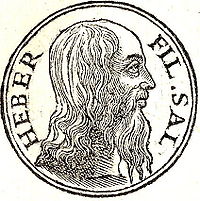Eber
Eber | |
|---|---|
 Eber imagined in the 1553 Promptuarium Iconum Insigniorum | |
| Children | Peleg Joktan |
| Parent | Selah |
Eber (
Lineage
Eber was a great-grandson of
In the Septuagint, the name is written as Heber/Eber (῞Εβερ/Ἔβερ), and his father is called Sala (Σαλά/Σάλα). His son is called Phaleg/Phalek (Φαλέγ/Φάλεκ), born when Heber was 34 years old, and he had other sons and daughters. Heber lived to an age of 464 years.[3][4]
Name
The
Medieval scholars such as Michael the Syrian, Bar Hebraeus, and Agapius of Hierapolis noted that the prevailing view was the Hebrews (Hebrew: עִבְרִיִּים, romanized: ʿIḇriyyim, also derived from the letters ʿ-b-r) had received their name from ʿEber,[7][8] while others state the name "Hebrew" means "those who cross", a reference to those who crossed the Euphrates with Abram from Ur of the Chaldees to Harran and then Canaan.[6]
In some translations of the
Hebrew
The 13th-century Muslim historian
In Islam
ʿEber is sometimes referred to in classical Islamic writings as the "father" of the "prehistoric, original Arabs" (the ʿArab al-ʿĀriba), who lived in the Arabian Peninsula after the Deluge.[10] ʿEber was also identified with the Muslim prophet Hud by some of the early Muslim authorities, who has a surah named after him in the Quran.[11] Other sources identify the prophet Hud as ʿEber's son.[11][12]
See also
References
- ^ JSTOR 3261014.
- ^ Genesis 11:14–17
- ^ Genesis 11:14–17
- ^ "Septuagint Genesis, Ch. 10 - Part 3".
- ^ Marcus Jastrow, A Dictionary of the Targumim, the Talmud Babli and Yerushalmi, and the Midrashic Literature (London, W.C.: Luzac & Co. ; New York: G. P. Putnam's Sons; 1903), p. 1039 etc.
- ^ a b
 Hirsch, Emil G.; König, Eduard (1903). "Eber". In Singer, Isidore; et al. (eds.). The Jewish Encyclopedia. Vol. 5. New York: Funk & Wagnalls. p. 30.
Hirsch, Emil G.; König, Eduard (1903). "Eber". In Singer, Isidore; et al. (eds.). The Jewish Encyclopedia. Vol. 5. New York: Funk & Wagnalls. p. 30.
- ^ Who Were the Hebrews?
- ^ "EBER - JewishEncyclopedia.com". www.jewishencyclopedia.com. Retrieved March 3, 2019.
- Jewish Encyclopedia; Funk & Wagnalls, 1906.
- T.W. Arnold, R. Basset, R. Hartmann.
- ^ T.W. Arnold, R. Basset, R. Hartmann.
- )
